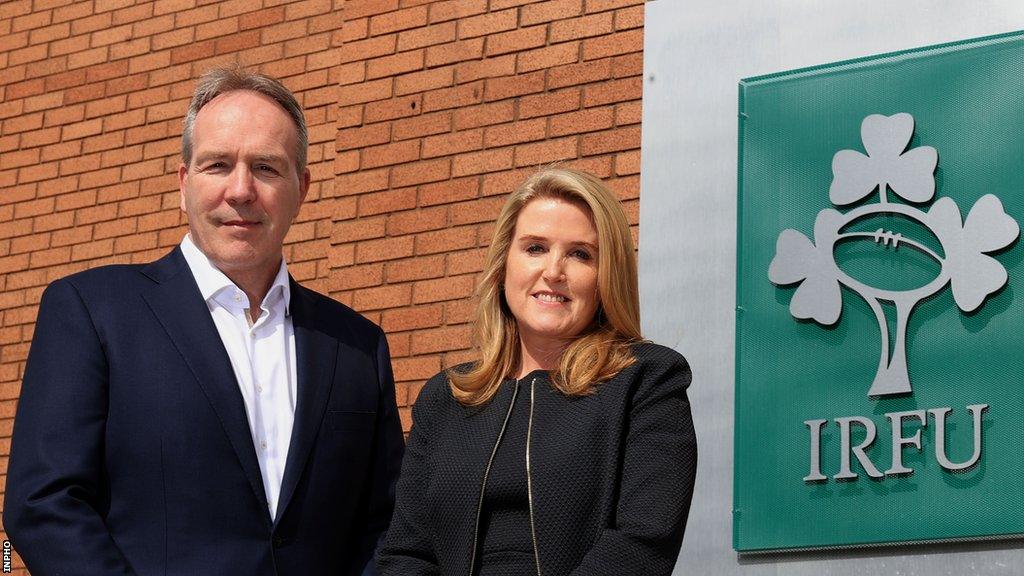IRFU expects 'more challenging' year with 'significant costs' of Rugby World Cup
- Published

IRFU chief executive Kevin Potts and the union's chief financial officer Thelma O'Driscoll, who took up her position in September
The Irish Rugby Football Union (IRFU) expects a "more challenging" year due to the "significant costs" of the Rugby World Cup as it revealed its accounts for the year ended 31 July.
After the Ireland men's team's Six Nations Grand Slam success, the IRFU reported a deficit of 1m euro (£868,752) for 2022-23 with 7.4m (£6.4m) euro having been forecast.
The IRFU's income also fell to 92m euro (£79.9m) from 116m euro (£100m), while expenditure decreased to 93m euro (£80m) from 110m euro (£95m).
The union said the decreased income was "due in large part to a Government Covid grant which was received during the 2021-22 accounting period in respect of Covid related losses in 2021".
The IRFU also reported "relatively unchanged" assets of 106m euro (£92m) and cash balances of 63m euro (£54.7m).
This year, Ireland secured a Grand Slam triumph and won their three World Cup warm-up matches before again exiting the tournament in France at the quarter-final stage.
IRFU chief executive Kevin Potts said: "It is essential for us as a governing body to live within our means and still ensure that the game is thriving throughout our four provinces.
"While we are reporting a deficit today, it is much smaller than anticipated, thanks to prudent financial management, the men's Grand Slam win and the availability of extra funding.
"This current financial year, however, will be more challenging for the IRFU with significant costs associated with Rugby World Cup together with the loss of income from our regular November internationals.
"We must continue to operate in a manner that ensures the sustainability of the game at all levels."
Potts indicated that the Rugby World Cup will have cost an estimated 15m euro (£13m), of which 5m (£4.34m) euro will be covered by World Rugby.
Thelma O'Driscoll, who was appointed the IRFU's chief financial officer earlier this year having held a similar position with the British and Irish Lions, said: "Like any organisation, the Union is very aware of inflationary pressures, and we continue to focus on the generation of income to offset this pressure, allowing us to continue investing back into the game.
"Additional funding from Sport Ireland has allowed us to assist our clubs further with initiatives to make their facilities more energy efficient, to provide specialist equipment, and fund essential new roles that would otherwise have increased our deficit. We are extremely appreciative of this support from Sport Ireland."
Meanwhile, at the IRFU's annual general meeting on Friday, the body elected four new provincial representatives to its union committee as it moves towards achieving a 40% gender balance before the end of the year.
Earlier this year, the IRFU unanimously approved a proposal to achieve 40% female representation on its committee.
"At the next meeting in December, we will approve an additional three co-opted female members thereby reaching the 40% gender balance on the Union Committee for the first time," said Potts.
"This will be a very welcome and positive milestone for our sport."